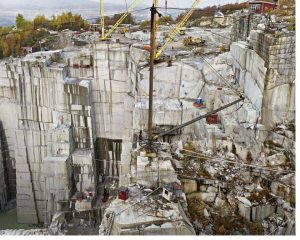
![]() Canadian photographer Edward Burtynsky is one of the best-known environmental photographers in the world. From his early photographs of quarries in Vermont to his current project, Anthropocene, Burtynsky has focused on what he calls the “residual landscape” in which nature is transformed by industry. For over three decades, Burtynsky’s mission as an artist has been to create aesthetically compelling photographs with a message about our increasingly unsustainable appetite for our planet’s limited resources.
Canadian photographer Edward Burtynsky is one of the best-known environmental photographers in the world. From his early photographs of quarries in Vermont to his current project, Anthropocene, Burtynsky has focused on what he calls the “residual landscape” in which nature is transformed by industry. For over three decades, Burtynsky’s mission as an artist has been to create aesthetically compelling photographs with a message about our increasingly unsustainable appetite for our planet’s limited resources.
Resource extraction is as old as human civilization; however, today’s rates of consumption are exceeding the supplies needed to maintain our modern lifestyles. In photographic essays on oil, water, and mining in particular, Burtynsky makes this point with images that counter their bleak message with luscious colors and visually complex compositions. While some critics have questioned this contradiction, in Burtynsky’s view compelling images lead viewers to his deeper message.
Burtynsky began by photographing the “pristine” wilderness, but, as he has stated, “I felt I was born a hundred years too late to be searching for the sublime in nature. To me, pursuing this would have just been an expression of nostalgia.”[footnote]Edward Burtynsky, Manufactured Landscapes: The Photographs of Edward Burtynsky (Ottawa:National Gallery of Canada, 2003), p. 47.[/footnote] Although Burtynsky’s works are usually thought of within the aesthetic category of the industrial sublime, Joshua Schuster has observed that “the sublime is breathlessness at a distance that stays distant and thus involves an uneasy relationship with forms of hands-on environmentalist activism.”[footnote]Joshua Schuster, “Between Manufacturing and Landscapes: Edward Burtynsky and the Photography of Ecology,” Photography & Culture 6(July 2013), p. 194.[/footnote] Schuster proposes the category of “ecological sublime” for Burtynsky (although with his emphasis on photographing the largest quarry, the largest mine, the largest oil spill, perhaps we should also factor in the “statistical sublime” when considering his work).
Burtynsky’s work examines our complex ecological relationship to commodities. As he observed in 2007, “To me, if you build your polemics around the point that all corporations are bad, it lacks necessary complexity; it is just too narrow and almost a caricature of a view. …it is …quite easy for some environmentalists to feel self-righteous, to get up on the soapbox without the full grasp of the complexity of the problem. My goal is to allow dialogue, not to draw lines and start throwing things at each other again, because this has not gotten us anywhere all these years.”[footnote]Christopher Grabowski, “Framing Global Capitalism,” The Tyee, January 19, 2007. http://thetyee.ca/Photo/2007/01/19/GlobalCapitalism. Accessed August 1, 2016.[/footnote]